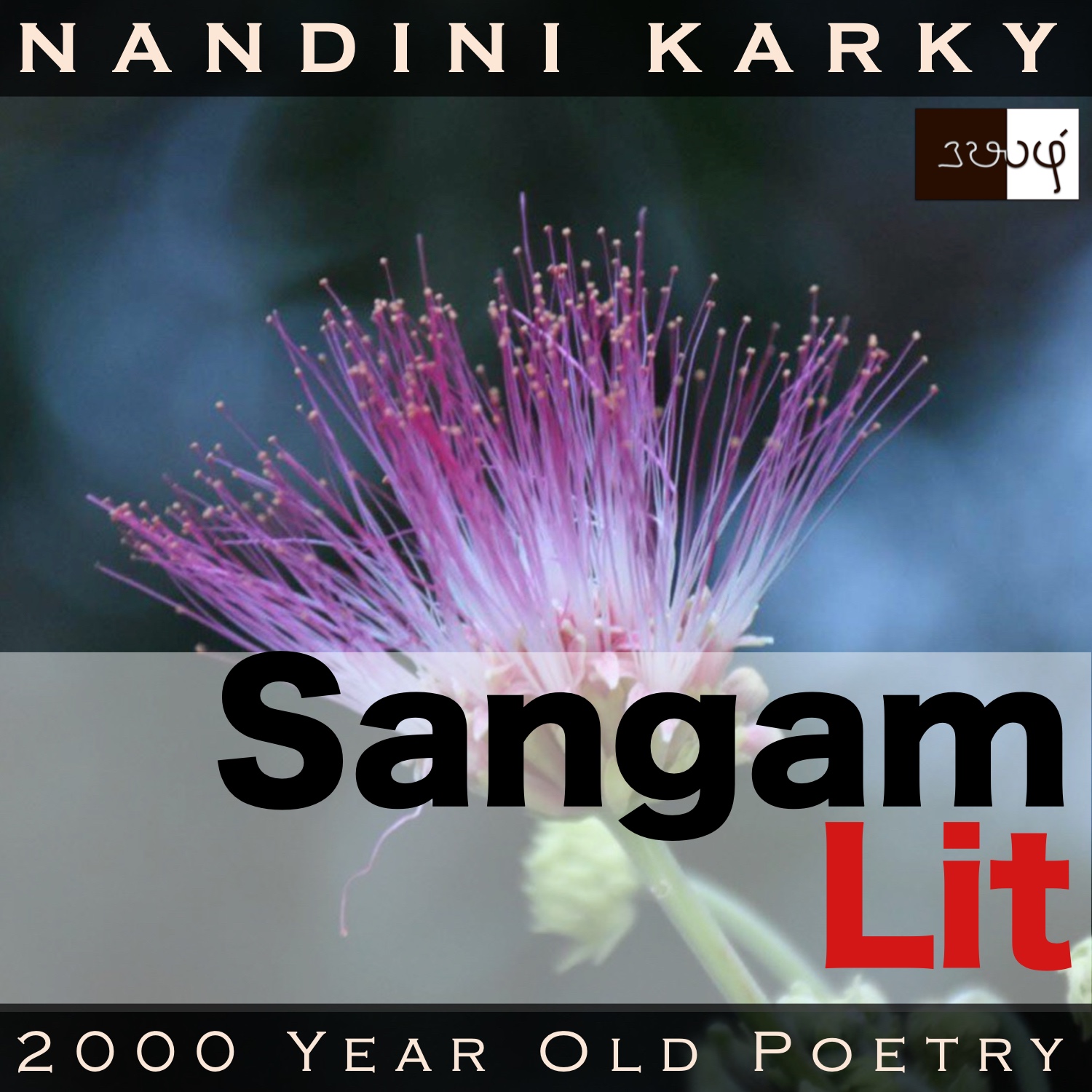Podcast: Play in new window | Download
Subscribe: Apple Podcasts | Spotify | Amazon Music | Android | iHeartRadio | TuneIn | RSS | More

In this episode, we perceive the journey of a breeze, as portrayed in Sangam Literary work, Natrinai 193, penned by an anonymous poet. The verse is set in the ‘Paalai’ landscape of ‘drylands’ and speaks in the voice of the lady to the northern wind, pleading to not torment her at a time when the man has parted away.
அட்டரக்கு உருவின் வட்டு முகை ஈங்கைத்
துய்த் தலைப் புது மலர்த் துளி தலைக் கலாவ,
நிறை நீர்ப் புனிற்றுப் புலம் துழைஇ, ஆனாய்,
இரும் புறம் தழூஉம் பெருந் தண் வாடை!
நினக்குத் தீது அறிந்தன்றோ இலமே;
பணைத் தோள் எல் வளை ஞெகிழ்த்த எம் காதலர்
அருஞ் செயல் பொருட் பிணிப் பிரிந்தனராக,
யாரும் இல் ஒரு சிறை இருந்து,
பேர் அஞர் உறுவியை வருத்தாதீமே!
Opening with the words ‘அட்டரக்கு உருவின்’ meaning ‘the hue of melted lac’, the poem splashes a passionate red on the verse. We learn the colour reference is in connection to the ‘ஈங்கை’ or ‘mimosa flowers’. Shortly thereafter, appears ’புனிற்றுப் புலம்’ meaning ‘water-soaked, rich fields’. The entity to which the song is addressed becomes evident with ‘பெருந் தண் வாடை’ or ‘great, cold northern wind’. The phrase ‘பணைத் தோள் எல் வளை ஞெகிழ்த்த’ brings to fore, the quintessential Sangam image of ‘bangles slipping from the bamboo-like arms of a lady’, a sign of pining in the period of parting. The song ends with a heartrending request in ‘வருத்தாதீமே’ meaning ‘do not torture me so’. Moving from words, let’s expand our understanding by exploring the meaning in the verse.
The man and lady have been leading a happy, married life when the time comes for the man to part with the lady, to go in search of wealth. He promises to return within a particular season and the lady waits patiently till then. The time he promised he would return passes by, leaving the lady in anguish. On one such day, she turns to the northern winds and says, “In the colour of melted lac, the circular buds of the ‘eengai’ tree bloom into soft-headed new flowers, whose honey drops fuse in you. Then, you traverse to water-filled, fertile fields and stir up the ponds. Not staying there for long, you come near me and dash against my back, O noble, cold, northern wind! I have never wished you harm. In this time, when my lover has parted because of his desire to earn difficult-to-attain wealth, thus making the shining bangles on my bamboo-like arms slip and fall, please do not distress me, this suffering-filled being, who stays all alone in one place!” With these words, the lady expresses the pain in her heart at the man’s prolonged parting.
Now, for the little nuances in the verse! The lady talks to the northern wind, as if it were a person she knew well. She starts by saying she knows where the breeze has been. Bringing forth the image of the mimosa tree, she paints for us with melted red lac, the flowers that bloom on this tree, with a soft, cottony head. The first stop-over of the northern wind seems to be near these mimosa flowers to gather the honey brimming over from the new buds. Then, the wind journeys to fertile fields and takes a dive into the ponds and soars above, drenched with moisture. From there, the lady says, this wind seems to arrive at her doorstep and holds her in its clutches. She lets out a cry of pain declaring that not for one moment, she has thought of any harm for this wind. But, why then, is it assailing her thus? That too, at a time, when the man has parted away with the intention of gathering wealth, leaving her to pine, thus making her fine arms lose their health and beauty, shrivel and make those shining bangles therein slip and fall. The lady makes her position clear that she is all alone with no one for company and is filled to the core with misery. So, she pleads to the wind to not torment her any further.
The poem highlights the curious way of how even non-living things seem to come alive and become a person to someone, who feels forsaken. This brings to my mind, the movie ‘Cast away’, wherein a man happens to be abandoned on an uninhabited island, because of a plane crash, with no one coming to his aid for years together. The connection to this verse is that, having no one for company, that abandoned man starts imagining a volleyball he finds, as a person and his friend. This tale, centuries later, echoes the same feeling in the poem where the lady seems to see the wind as a person and expresses her pain by conversing with it. A fundamental truth about the mind is revealed here, wherein even if it’s only a ball or the breeze, it’s human to reach out to connect and draw solace in a moment of loneliness!




Share your thoughts...